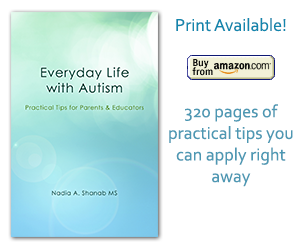By Nadia Shanab | Uncategorized
One of the common traits of autism is the inability or having difficulty imitating people. Training children with autism to imitate or copy is very important from an early age. Many children with autism can learn this skill. Learning to imitate improves social skills and enhances communication and human interaction. But How do they imitate?
Tags: autism, communication, parenting, research, symptoms of autism
Posted in Uncategorized | Comments Off on Autistic Kids Can Imitate but Skip The “Silly”
By Nadia Shanab | Uncategorized
Beginning April, Dr. Landa at The Kennedy Krieger Institute is offering a FREE developmental assessments for infants between ages 5 to 10 months who have an older sibling with autism and live within the Mid-Atalntic five-state region (Maryland, Delaware, Pennsylvania, Virginia, West Verginia) or District of Colombia. The risk or likelihood of having a subsequent
Tags: autism, communication, consequences, discipline, flexibility, health, independence, parenting, research, social interaction, symptoms of autism
Posted in Uncategorized | Comments Off on Risk of Autism in Subsequent Siblings
By Nadia Shanab | Uncategorized
‘A paper published this month (April 2013) in the medical journal Lancet Neurology suggests that a broad spectrum of developmental and psychiatric disorders, ranging from autism and intellectual disability to schizophrenia, should be conceptualized as different manifestations (presentations or signs) of a common underlying factor “developmental brain dysfunction” rather than completely independent conditions with distinct
Tags: asperger's syndrome, autism, communication, genetics, parenting, psychiatiric disorders, research, symptoms of autism, tips
Posted in Uncategorized | Comments Off on Neurodevelopmental Disorders and Psychiatric Disorders Are A Continuum
By Nadia Shanab | Uncategorized
Vaccines has been an important topic of research and discussions for so many years. Some parents have a deep belief that the tripple vaccine was the cause of their child’s condition of autism. In a recent research the connection between autism and vaccines failed. It recommeds to keep the vaccines schedule. Read the full article
Tags: asperger's syndrome, autism, communication, consequences, discipline, health, independence, parenting, research, symptoms of autism, tips
Posted in Uncategorized | Comments Off on No Connection Between Autism and Vaccines
By Nadia Shanab | Uncategorized
A research done at habricentral.org has shown that kids with autism showed an increased social interaction in the presence of pets. They smiled, laughed, looked at human faces, and became more talkative in the presence of pets compared to toys. They also did less crying, whining, frowning, and became less self-focused in the presence of
Tags: asperger's syndrome, autism, communication, discipline, flexibility, independence, occupational therapy, parenting, research, sensory, social interaction, tips
Posted in Uncategorized | Comments Off on Human-Animal Bond Enhances Social Interaction
By Nadia Shanab | Uncategorized
Today is the International Autism Awareness Day. I would like to seize the opportunity and share in raising awareness about autism. My book is now sold on iTunes, Kindle-Amazon, and Nook for $4.99 only. If you are interested in a hard copy its is also available for $14.99 instead of $19.99 from my webstore or
Tags: asperger's syndrome, autism, communication, consequences, discipline, flexibility, health, independence, occupational therapy, organization, parenting, research, schedule, senses, sensory, social interaction, speech, Temple Grandin, tips, visual aids
Posted in Uncategorized | Comments Off on “Everyday Life with Autism” Is Now on Sale $4.99
By Nadia Shanab | Uncategorized
Autsim Speaks published a great article to summerize the most important things about autism we didn’t know a year ago. Read the article here: www.autismspeaks.org/science/science-news/ten-important-things-we-know-about-autism-today-–-we-didn’t-know-year-ago As an educator working with kids with autism I feel obligated to tell the parents the following: 1- I have seen kids making a great progress over the years, and
Tags: asperger's syndrome, autism, communication, consequences, discipline, flexibility, health, independence, organization, parenting, schedule, sensory, social interaction, techniques, tips, visual aids
Posted in Uncategorized | Comments Off on Awareness Day
By Nadia Shanab | Uncategorized
Being different doesn’t imply being inferior. It is okay to be different. If you are a new visitor to my blog, I say to you: “Welcome, you came here on the right time, because this is a special article dedicated to summarize the topic of autism and try to raise awareness and advocate for individuals
Tags: asperger's syndrome, autism, communication, consequences, discipline, health, independence, organization, parenting, schedule, senses, social interaction, speech, symptoms of autism, tips, visual aids
Posted in Uncategorized | Comments Off on World Autism Awareness Day April 2nd
By Nadia Shanab | Uncategorized
Sometimes we make the assumption that children with ASD wouldn’t be able to understand our regular language which is spoken in full sentences. When I catch myself talking to a student as if I was talking to a colleague of my mine, I would immediately rephrase my previous sentence and turn it into a much
Tags: autism, communication, consequences, parenting, speech, symptoms of autism, tips
Posted in Uncategorized | Comments Off on Don’t Underestimate ASD Kids’ Intelligence
By Nadia Shanab | Uncategorized
Dear Parents, This message is not aiming to burden you further with more efforts or worries. It is rather a call for co-operation with school to get the best out of the time your child spends in school. Here are some simple tips that can save you and the educators a huge amount of time
Tags: asperger's syndrome, autism, communication, consequences, discipline, flexibility, health, independence, organization, parenting, schedule, sensory, techniques, tips
Posted in Uncategorized | Comments Off on Tips to Maximize Learning Time

